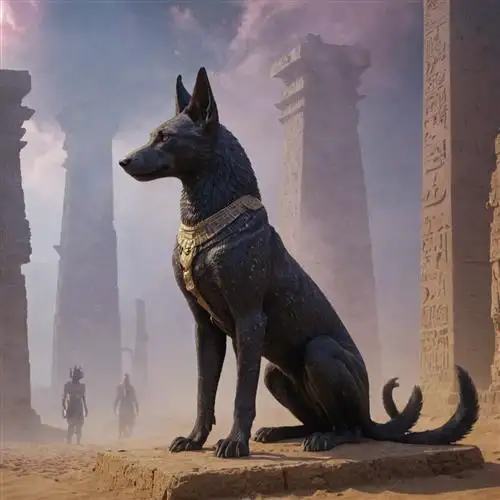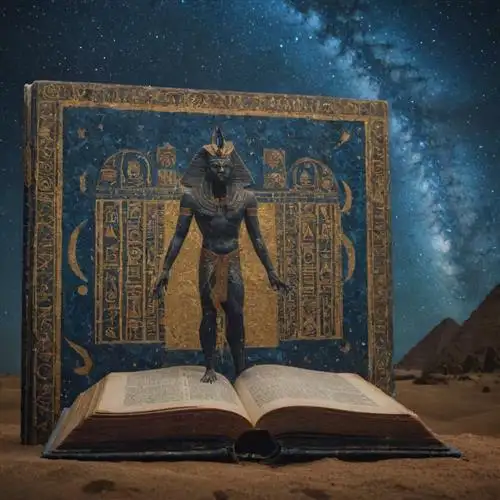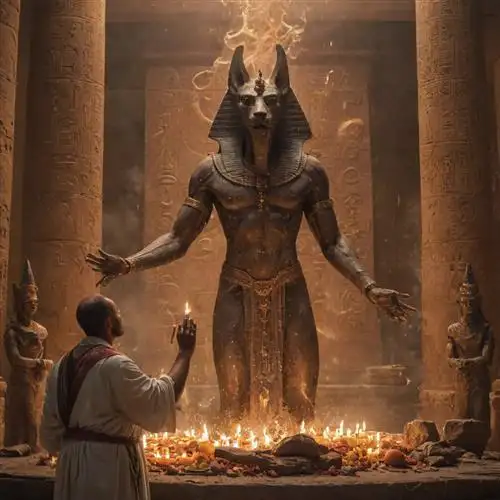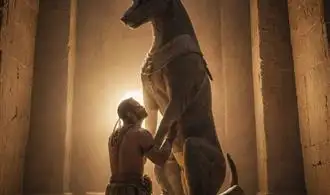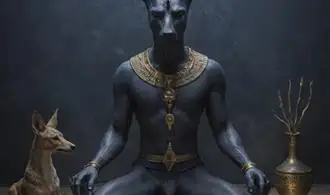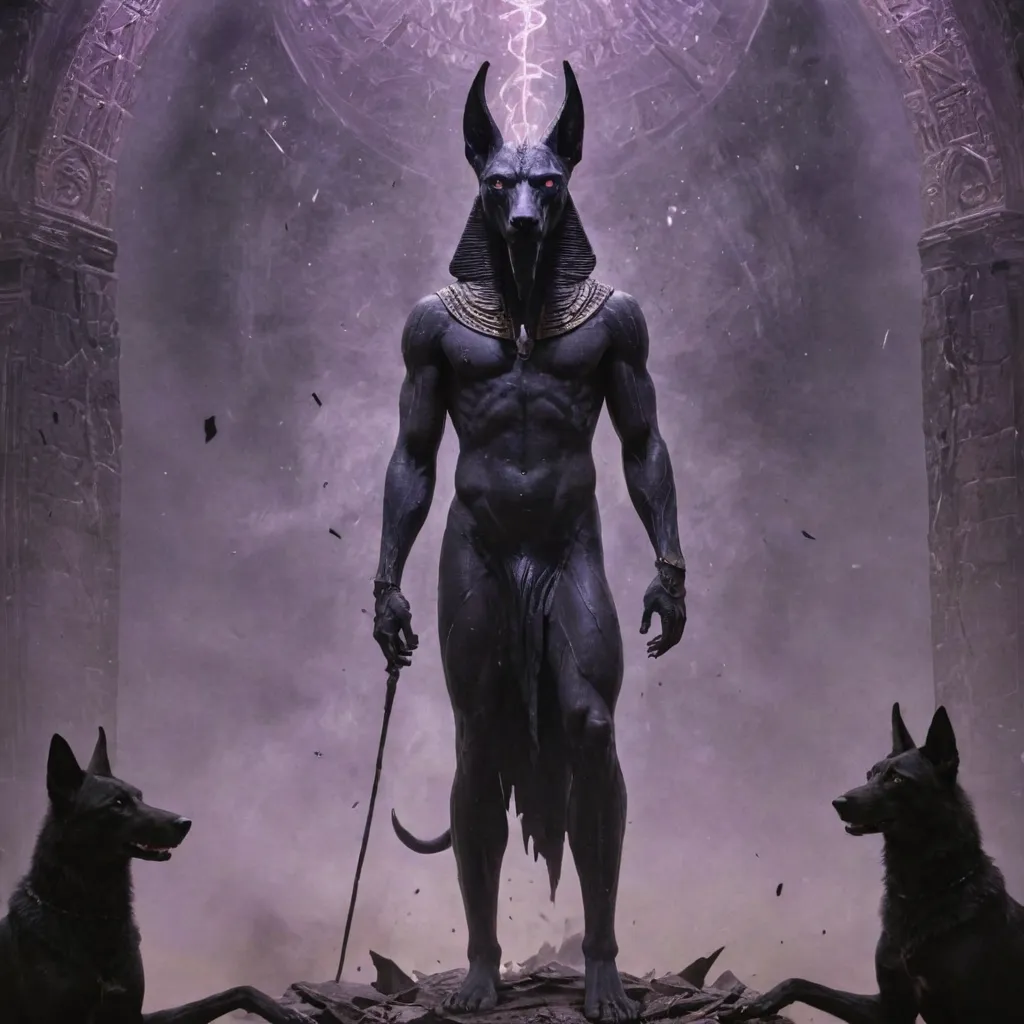
The Dread Lord of the Dead
In ancient Egyptian mythology, Anubis, the jackal-headed deity, presides over the realm of the dead, guiding souls through the treacherous journey of the afterlife. Often depicted as the "Dread Lord of the Dead," Anubis is a figure of both reverence and trepidation, commanding the respect and fear of those who dare to venture into the unknown world beyond the veil of mortality.
Anubis's role as the gatekeeper to the afterlife is a complex and multifaceted one. As the protector of the dead, he is responsible for the mummification process, ensuring that the physical remains of the deceased are properly prepared for their journey to the afterlife. This meticulous attention to detail is a testament to Anubis's unwavering dedication to the sanctity of the dead and the preservation of their essence beyond the realm of the living.
However, Anubis's role extends far beyond the physical realm. He is also the guardian of the scales of judgment, weighing the hearts of the deceased against the feather of truth to determine their worthiness for eternal life. This solemn duty instills a sense of dread and anticipation in those who face the final judgment, for the consequences of Anubis's decision can mean the difference between a blissful existence in the afterlife or eternal damnation.
Despite the formidable power and authority Anubis wields, he is not to be feared, but rather revered and respected. By understanding the complexities of his role and the profound significance of his presence in the afterlife, one can navigate the journey beyond the mortal plane with a greater sense of purpose and understanding. Engaging in Anubis Rituals That Will Change Your Life can help individuals forge a deeper connection with the Dread Lord of the Dead, seeking his guidance and protection as they embark on the final voyage.
Navigating the Weighing of the Heart
The process of the Weighing of the Heart, as depicted in ancient Egyptian mythology, is a pivotal moment in one's journey through the afterlife. Anubis, the jackal-headed god, serves as the guide and overseer of this sacred ritual, ensuring the deceased's heart is balanced against the feather of Ma'at, the goddess of truth and justice. This intricate procedure holds profound significance, as it determines the fate of the soul, paving the way for either eternal bliss or eternal damnation.
To navigate this critical juncture without fear, it is essential to understand the intricacies of the Weighing of the Heart ceremony. The heart, seen as the embodiment of one's actions, thoughts, and emotions, is placed on one side of the scale, while the feather of Ma'at, representing the principles of truth, balance, and justice, is placed on the other. If the heart is found to be heavier than the feather, it is devoured by the monstrous Ammit, condemning the individual to eternal oblivion. Conversely, if the heart is found to be in perfect equilibrium with the feather, the soul is granted passage to the eternal realm of the afterlife, where they may bask in the glory of the divine.
It is crucial for the deceased to have led a life of virtue, honesty, and adherence to the principles of Ma'at. This ensures that their heart is not weighed down by the burden of misdeeds, wrongdoings, or a lack of integrity. By living a life of moral uprightness, the individual can approach the Weighing of the Heart with confidence, knowing that their heart will be found worthy of passage into the afterlife.
Additionally, the role of the deceased's loved ones and the funerary rituals performed on their behalf cannot be overstated. The careful preparation of the body, the recitation of sacred spells, and the inclusion of amulets and talismans can all aid in the successful navigation of the Weighing of the Heart. These rituals not only honor the deceased but also serve to protect and guide the soul through the treacherous journey of the afterlife.
Furthermore, the cultivation of a deep understanding and reverence for the ancient Egyptian pantheon, particularly Anubis and Ma'at, can provide the deceased with a sense of comfort and guidance during this critical moment. By familiarizing oneself with the roles and symbolism of these deities, the individual can better anticipate and respond to the challenges they may face during the Weighing of the Heart.
The Secrets of the Book of the Dead
The Book of the Dead, also known as the Papyrus of Ani, is a collection of ancient Egyptian funerary texts believed to have been used to guide the deceased through the afterlife. This sacred text, which dates back to the 16th century BCE, offers a wealth of insights into the beliefs and practices surrounding the journey of the soul after death, including the role of Anubis, the jackal-headed god of the dead.
One of the key secrets revealed in the Book of the Dead is the importance of proper preparation for the afterlife. According to the text, the deceased must undergo a series of rituals and recitations to ensure a smooth transition into the next world. This includes the creation of a detailed "map" of the afterlife, known as the "Negative Confessions," which outlines the virtues and transgressions of the individual. By reciting these confessions, the soul can demonstrate its worthiness and avoid the pitfalls of the underworld.
Another crucial element of the Book of the Dead is the role of Anubis as the guardian of the deceased. As the god responsible for overseeing the mummification process and the weighing of the heart, Anubis plays a central role in the journey of the soul. The text provides detailed instructions on how to appease and honor Anubis, including the offering of specific prayers and sacrifices.
One of the most fascinating aspects of the Book of the Dead is the description of the "Hall of Judgment," where the soul's deeds are weighed against the feather of Ma'at, the goddess of truth and justice. This process, known as the "Weighing of the Heart," is overseen by Anubis, who ensures the fairness of the judgment. The text offers a glimpse into the ancient Egyptian belief that the afterlife is a place of moral reckoning, where the soul must account for its actions in life.
In addition to the rituals and practices outlined in the Book of the Dead, the text also provides insights into the ancient Egyptian conception of the afterlife. According to the beliefs reflected in the text, the afterlife is not a static or monotonous existence, but a dynamic and multifaceted realm where the soul must navigate various challenges and obstacles. The Book of the Dead offers a detailed map of this journey, guiding the deceased through the various regions and encounters they may face.
Appeasing the Jackal-Headed God
Anubis, the powerful jackal-headed deity of ancient Egyptian mythology, is a complex and multifaceted figure. As the god of the underworld, embalming, and the ritual preparation of the dead, Anubis played a critical role in the afterlife journey of the ancient Egyptians. To navigate the treacherous realms of the afterlife without fear, it is essential to understand how to appease this formidable guardian of the dead.
One of the primary ways to honor Anubis is through ritual and ceremony. Ancient Egyptians would perform elaborate funerary rites, including the mummification process, to ensure the deceased's safe passage to the afterlife. These rituals were overseen by priests who were trained in the sacred arts of embalming and funerary practices. By meticulously following these established protocols, the living could demonstrate their reverence for Anubis and secure his favor.
Additionally, offerings and invocations were central to appeasing the jackal-headed god. Egyptians would present Anubis with a variety of offerings, such as food, incense, and precious oils, to ensure his protection and guidance in the afterlife. Prayers and invocations were also commonly recited, asking Anubis to oversee the deceased's transition and to grant them safe passage through the various gates and challenges of the underworld.
Another crucial aspect of appeasing Anubis was the proper preparation and preservation of the deceased's physical body. The mummification process, overseen by Anubis, was believed to be essential for the soul's successful transition to the afterlife. By ensuring the body was meticulously prepared and protected, the living could demonstrate their respect for the deceased and their reverence for the god of the underworld.
Beyond the physical preparations, the ancient Egyptians also believed in the importance of the deceased's moral and spiritual purity. The ritual of the "Weighing of the Heart" was a crucial step in the afterlife journey, where the deceased's heart was weighed against the feather of Ma'at, the goddess of truth and justice. Only those whose hearts were found to be pure and righteous would be granted passage to the afterlife under Anubis' watchful gaze.
Encountering Anubis in the Afterlife
As the ancient Egyptian deity of the dead, Anubis plays a pivotal role in the afterlife journey. Navigating this encounter with the jackal-headed god requires a nuanced understanding of his role and responsibilities. Anubis is the gatekeeper to the underworld, guiding the deceased through the treacherous terrain of the afterlife and presiding over the crucial ritual of weighing the heart.
The weighing of the heart ceremony is a critical moment in the afterlife. Anubis carefully places the deceased's heart on one side of the scale, while the feather of truth rests on the other. This delicate balance determines the fate of the soul. A heart that is found to be pure and virtuous will be allowed to pass into the afterlife, while a heart weighted down by misdeeds will be devoured by the monstrous Ammit, condemning the soul to eternal oblivion.
Approaching Anubis with reverence and understanding is paramount. The deceased must be prepared to recite the necessary spells and declarations, demonstrating their worthiness and commitment to upholding the principles of Ma'at, the ancient Egyptian concept of cosmic order, truth, and justice. Failure to do so may result in a perilous encounter with Anubis, who is known to be both stern and unforgiving.
It is also essential to recognize Anubis's dual nature. While he is the guardian of the dead, he also possesses the power to grant eternal life to those who have proven themselves worthy. By embracing Anubis's role as a protector and guide, the deceased can navigate the afterlife with confidence, secure in the knowledge that they are under the watchful eye of this powerful deity.

